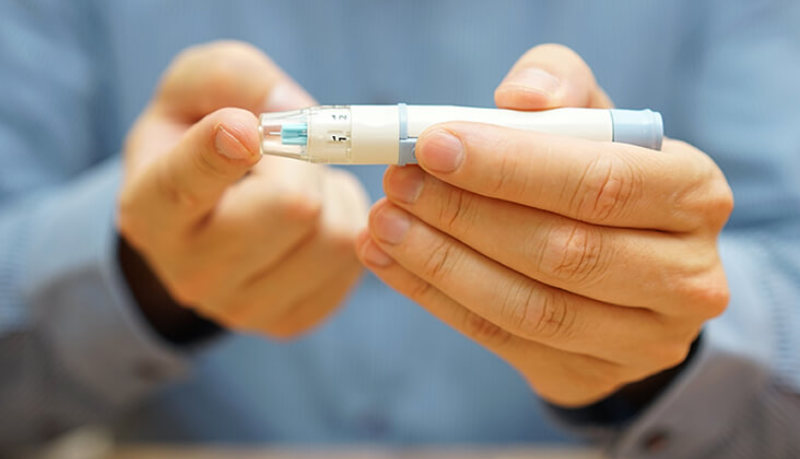
Diabetes is a chronic disease that is a disorder of the functionality of the pancreas. When the pancreas functionality is disturbed and it’s no longer able to produce insulin, or when the body is not capable to make good use of the insulin it makes. Insulin is a hormone produced by the pancreas that acts like a key to let glucose from the food we eat pass from the bloodstream into the cells in the body to produce energy. Carbohydrates in our food are broken down into glucose in the blood. Insulin helps glucose get into the cells.
When the pancreas is not being able to manufacture insulin or use it efficiently leads to raised glucose levels in the blood (known as hyperglycemia). Over time, high glucose levels are connected with damage to the body tissues and failure of various organs and tissues.
Types of diabetes:
There are two main common types of diabetes:
- Type 1 Diabetes
- Type 2 Diabetes
Type1 Diabetes
Type1 Diabetes can develop at any age of your life but occurs most frequently in children and young people. When you are diagnosed with type 1 diabetes, it means your body produces very little or no insulin, which means that you need daily insulin injections to maintain blood glucose levels under control.
Type2 diabetes
Type 2 Diabetes is more common in adults and it is estimated that it includes around 90% of all diabetes cases. When you have type 2 diabetes, your body is not efficient in good use of the insulin that it produces. The basis of the treatment of type 2 diabetes is a healthy lifestyle, including Improved physical activity and a healthy diet. However, with time, most people with type 2 diabetes will need oral drugs and/or insulin to keep their blood glucose levels under control.
Why Pakistani Getting Diabetes
The Pakistan lifestyle includes a lot of stress and lack of activities in their daily life. So people fall into obesity or become a patient of low or high blood pressure. The other factor is that we eat a lot of fatty food and do not burn the calories in fatty foods. The occurrence of prediabetes and diabetes in Pakistan is continuously growing in Pakistan. The rate varied in different parts, with the highest in Sindh and lowest in Khyber Pakhtunkhwa.

In males and females, the rate of diabetes patients is different in Pakistan. The type 2 diabetes mellitus rate in Pakistan is 11.77%. The rate in males is 11.20% and in females 9.19%. The mean frequency distribution in Sindh province is 16.2% in males affected by Diabetes and 11.70 % in females are affected; in Punjab province, it is 12.14% in males and 9.83% in females are affected by diabetes.
Ways to Prevent Diabetes

Diabetes can lead to blindness, kidney failure, heart disease, and other serious conditions. At first, when diabetes is not diagnosed, there is a stage where blood sugar levels are high but not high enough to be identified as diabetes. This is known as prediabetes to diabetes. This doesn’t mean that Diabetes is inevitable. If you are diagnosed with a high sugar level Diabetes can be averted by adopting a better lifestyle.
It’s studied that up to 70% of people with prediabetes people develop type 2 diabetes. Fortunately, progressing from prediabetes although there are certain factors you can’t change such as your genes, age, or past behaviors there are many actions you can take to reduce the risk of diabetes.
Cut Sugar and Refined Carbs From Your Diet
Too much sugary food and sweets are endangered for you to develop diabetes at an early age. Your digestive system quickly breaks this food down into tiny sugar molecules and particles, which are immersed into your bloodstream. The result is the rise in blood sugar level which stimulates your pancreas to produce insulin. The main function of insulin is to help sugar out of the bloodstream and into your body’s cells.
In prediabetes patients, the body’s cells are opposed to insulin’s action, so sugar leftovers in the blood. To balance it, the pancreas makes more insulin, attempting to bring blood sugar down to a normal level.
With time, this can lead to gradually higher blood sugar and insulin levels, ultimately the condition finally turns into type 2 diabetes.
Exercise regularly

You should try to increase your physical activity daily, performing physical activities may help you to prevent diabetes. Exercise increases the insulin sensitivity of your cells. So when you work out, less insulin is necessary to keep your blood sugar levels under control.
Exercising and working out more frequently appears to improve insulin response and function. One study shows that people at risk of diabetes established that burning more than 2,000 calories weekly by exercise is necessary to achieve these benefits.
Drink Water as Your Primary Beverage
Use water as your primary beverage water is the natural beverage you can drink. When you drink water you keep away from beverages that are high in sugar, preservatives, and other dubious ingredients.
Persons who drink more than two servings of sugar-sweetened beverages per day had a 99% increased risk of developing type 1 diabetes and a 20% increased risk of developing type 2 diabetes
By drinking water instead of artificial soda and other beverages may help you control the sugar level in the bloodstream. It also helps to maintain insulin levels and reduce the chances of diabetes.
Lose Weight If You’re Overweight or Obese
Everyone who develops type 2 diabetes is not overweight or obese but the majority are. Moreover, people who tend to develop prediabetes carry excessive fats in their midsection and around abdominal organs. This excessive weight is known as visceral fat.
The excess visceral fats increase inflammation and insulin resistance which amazingly increases the risk of diabetes.
What’s more, those with prediabetes tend to carry excess weight in their midsection and around abdominal organs like the liver. This is known as visceral fat.
Quit smoking addiction

Smoking contributes to many fatal diseases like heart disease, emphysema, cancer of the lungs, breast, prostate, and digestive tract. One recent study showed that smoking is strongly linked with developing risk of diabetes, especially heavy smokers. By quitting smoking has shown a reduced risk of diabetes over time.
Eat a High-Fiber Diet

Taking plenty of fiber-enriched food is better for your gut health and weight management. To reduce the chances of gaining weight and obesity. Eating a good fiber source in each meal may prevent the spike of blood sugar and insulin level, which ultimately reduces the chances of developing diabetes.
Optimize Vitamin D Levels

Studies have shown that vitamin D also helps in preventing blood sugar levels. The sources of vitamin D include fish and cod liver oil. Also, sun exposure increases vitamin D levels in the blood.
Minimize Your Intake of Processed Foods

Minimizing your intake of processed food to improve your health is to reduce your chances of getting diabetic. The processed foods are linked to all sorts of health problems, including heart disease, obesity, and diabetes.
